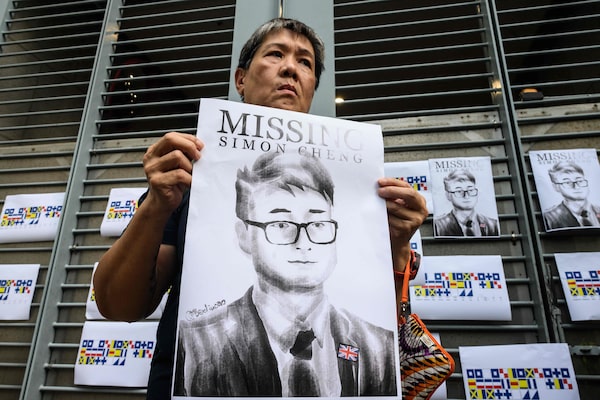
An activist holds an illustration of Simon Cheng during a gathering outside the British Consulate-General building in Hong Kong on Aug. 21, 2019.ANTHONY WALLACE/AFP/Getty Images
A former British diplomatic worker has accused China of torturing him to extract information about the protests in Hong Kong, adding to the international pressure building against Beijing.
On Aug. 8, Chinese state security agents seized Simon Cheng, a local staff member at the British consulate in Hong Kong, upon his return from a business trip. Over the days that followed, he said, Chinese authorities subjected him to lengthy interrogations, sleep deprivation and stress positions while demanding he confess that Britain instigated the protests by providing money and equipment and that he himself had organized demonstrations.
Mr. Cheng’s allegations, which he published in a lengthy account on Facebook, prompted Britain to summon the Chinese ambassador to express its outrage. China said Mr. Cheng’s rights had been protected and that he “himself admitted fully to his offences.”
But Foreign Secretary Dominic Raab said Wednesday that Britain considers Mr. Cheng’s account “credible” and said his treatment amounts to “torture.”
Mr. Cheng made public his account hours after the U.S. Senate passed a pair of bills that would restrict exports of some police riot control weaponry to Hong Kong and require an annual review of the city’s special trading status to determine if it remains sufficiently autonomous from China.
The bills prompted a furious response from Beijing, which itself summoned a senior U.S. diplomat Wednesday, while a committee of the National People’s Congress, the country’s rubber-stamp parliament, said the U.S. had ”grossly interfered in China’s internal affairs.” In a show of bipartisan support, the U.S. House of Representatives approved the bills 417-1 on Wednesday and sent them to the White House.
On Wednesday, Prime Minister Justin Trudeau said the issue of Hong Kong – and the 300,000 Canadians that live there – concerned him. “We repeatedly called upon China to respect the terms of the one country, two systems principles,” Mr. Trudeau said after swearing in the new cabinet.
China has long accused hostile foreign forces of fomenting discord in Hong Kong, where protests have continued for five months.
But the additional international pressure on Beijing was welcomed by protesters and pro-democracy leaders in Hong Kong.
“I hope this could help at least make the police, or the people in government or those in Beijing, be less aggressive in cracking down on the movement here,” said Ying Chi Lee, a dentist who is on Hong Kong’s Election Committee, the electoral college of 1,200 people who choose the city’s chief executive.
She and others shut down some streets in the downtown Wednesday in a lunchtime protest that was met by dozens of riot police, who at one point surrounded a young finance worker and threatened him with arrest.
“I was just waiting there, getting ready to go up for work because our office is just upstairs,” said the man, who did not provide his name. “And then they just suddenly surrounded me,” asking him, “What are you doing here?
Large demonstrations began in June to protest a proposed extradition treaty that would have made it easier to transfer people accused of serious crimes to China and try them there. The proposed treaty has now been withdrawn.
But the allegations by Mr. Cheng gave flesh to widespread concerns in the city about the exercise of justice in China.
Police accused Mr. Cheng of soliciting prostitution, a charge he did not explicitly deny in his account, saying only, “I got a massage for relaxation after work hours.”
But his interrogators were most interested in learning about his interactions with protesters. Mr. Cheng said he supports the pro-democracy movement, but he was also tasked by the British consulate with collecting information about the protests.
“They firmly believe the U.K. is one of the foreign powers to meddle with the Hong Kong protests,” Mr. Cheng wrote. ”I was suspected of being a mastermind and British proxy to incite and organize the protests.”
He said he was asked about three main topics: “1.) The UK role in the Hong Kong ‘riots’; 2.) my role in the ‘riots’; and 3.) my relations with mainlanders who joined the ‘riots.’ ”
He described several forms of physical mistreatment. “I was hung (handcuffed and shackled) on a steep X-Cross doing a spread-eagled pose for hours after hours. I was forced to keep my hands up, so blood cannot be pumped up my arms. It felt extremely painful,” he wrote.
“Sometimes, they ordered me to do the ‘stress tests,’ which includes extreme strength exercise such as ’squat’ and ’chair pose’ for countless hours. They beat me every time I failed to do so using something like sharpened batons. They also poked my vulnerable and shivering body parts, such as knee joint. I was blindfolded and hooded during the whole torture and interrogations, I sweated a lot, and felt exhausted, dizzy and suffocated.”
Treatment like that alleged by Mr. Cheng is “why people were so afraid of the extradition bill which sparked half a year of protest,” said Emily Lau, a pro-democracy politician in Hong Kong.
She acknowledged, however, the risks for Hong Kong as international pressure grows. The legislation passed by the U.S. Senate, for example, would threaten the city’s economy if it leads to the loss of its special trading status.
“I think the business people in Hong Kong are trembling in their boots, because they say once that’s gone, it means the game is over,” Ms. Lau said.
Because “if Hong Kong is hurt, I think China will also be hurt.”
With a report from Robert Fife
Our Morning Update and Evening Update newsletters are written by Globe editors, giving you a concise summary of the day’s most important headlines. Sign up today.
 Nathan VanderKlippe
Nathan VanderKlippe